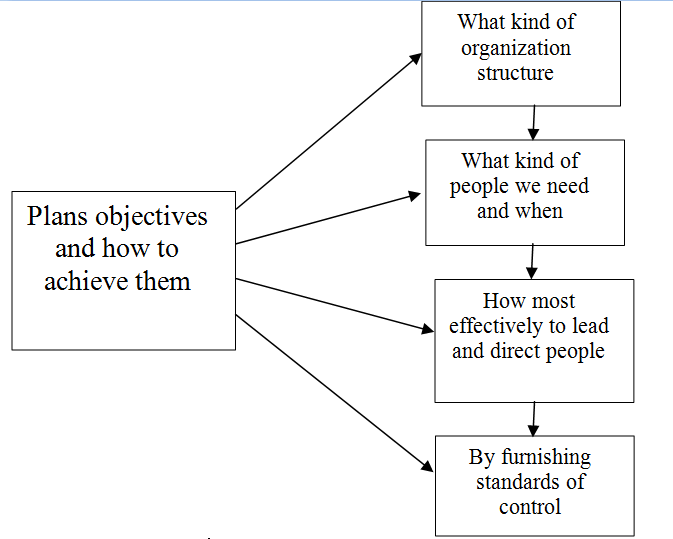The essential nature of planning can be highlighted by the four major aspects of planning: contribution to purpose and objective, primacy of planning, pervasiveness of planning, and efficiency of plans.
a) Contribution to Purpose and Objectives:
The purpose of every plan and all derivative plans is to facilitate the accomplishment of enterprise purpose and objectives. This principle derives from the nature of organized enterprise, which exists for the accomplishment of group purpose through deliberate cooperation. This was emphasized by koontz when he said:
“Plans alone can not make an enterprise successful. Action is required; the enterprise must operate. Plans can, however, focus on purposes. They can forecast which actions will tend toward the ultimate objective, which tend away, which will likely offset one another, and which are merely irrelevant. Managerial planning seeks to achieve a consistent, coordinated structure of operations focused on desired ends. Without plans, action must become merely random activity, producing nothing but chaos." (Koontz et al., 1980, p. 157).
b) Primacy of Planning:
Planning is the primary management function, the one that precedes and is the basis for the organizing, influencing, staffing, leading and controlling functions of managers. This can be shown in Figure 1.1.

Figure 1.1: Planning precedes all other managerial functions
Although all the functions intermesh in practice as a system of action, planning is unique in that it establishes the objectives necessary for all group effort. Besides, plans must be made to accomplish these objectives before the manager knows what kind of organization relationships and personal qualifications are needed, along which course subordinates are to be directed and led, and what kind of control is to be applied. And, of course, all the other managerial functions must be planned if they are to be effective.
c) Pervasiveness of Planning:
Planning is a function of all managers, although the character and breadth of planning will vary with their authority and with the nature of policies and plans outlined by their superiors. It is virtually impossible to circumscribe the area of choice where they can exercise no discretion, and unless they have some planning responsibility, it is doubtful that they are truly managers.
|
Recognition of the pervasiveness of planning goes far in clarifying the attempt on the part of some students of management to distinguish between policy making (the setting of guides for thinking in decision making and administration), or between the “manager” and the administrator” or “supervisor”. |
One manager, because of his or her authority delegation or position in the organization, may do more planning or more important planning than another, or the planning of one may be more basic and applicable to a larger portion of the enterprise than that of another.
However, all managers – from presidents to supervisors – plan. The supervisor of a factory crew plans in a limited area under fairly strict rules and procedures. Interestingly, in studies of work satisfactions, a principal factor found to account for the success of supervisors at the lowest organization level has been their ability to plan.
d) Efficiency of Plans:
The efficiency of a plan is measured by the amount it contributes to purpose and objectives as offset by the costs and other unsought consequences required to formulate and operate it. A plan can contribute to the attainment of objectives, but at too high or unnecessarily high costs. This concept of efficiency implies the normal ratio of input to output, but goes beyond the usual understanding of inputs and outputs in terms of pounds, labor hours, or units of production to include such value as individual and group satisfactions.
Many managers have followed plans, such as in the acquisition of certain aircraft by airlines, where costs were greater than the revenues obtainable. There have actually been some aircraft with which an airline was to make no money. Companies have inefficiently attempted to attain objectives in the face of the unsought consequence of market unacceptability, as happened when a motor car manufacturer tried to capture a market by emphasizing engineering without competitive advances in style.
Plans may also become inefficient in the attainment of objectives by jeopardizing group satisfactions. The new president of a company that was losing money attempted quickly to recognize and cut expenses by wholesale and unplanned layoffs of key personnel. This result in fear, resentment, and loss of morale led to so much lower productivity as to defeat his/her laudable objective of eliminating losses and making profits. And some attempts to install management appraisal and development programs have failed because of group resentment of the methods used, regardless of the basic soundness of the programs.
|
The nature of planning can be figured out from these four major aspects of planning:
|